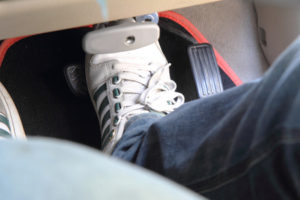Car brakes may only have one purpose, but it’s an absolutely essential purpose for not just yourself, but everyone on the road. We take for granted that when we press the brake pedal, the car will slow down and come to a stop. But what happens if you press the pedal and nothing happens? This is a terrifying situation, for sure, but knowing what to do if your brakes stop working can help you navigate through this rare problem to safety.
What to Do If Your Brakes Stop Working
Depending on how fast you are driving if your brakes stop working, it can be challenging to react quickly. Brake failure is a rare situation, so hopefully you will never need to use these tips!
What to Do If Your Brakes Stop Working
 Don’t panic. The worst thing you can do when your brakes fail is to panic. When you panic, you are far more prone to lose control of your car and the situation, leading to a far worse outcome and possible personal injury. Whether you are stuck in traffic or driving down the highway when your brakes fail, keeping a cool head will ensure the safety of yourself and drivers around you.
Don’t panic. The worst thing you can do when your brakes fail is to panic. When you panic, you are far more prone to lose control of your car and the situation, leading to a far worse outcome and possible personal injury. Whether you are stuck in traffic or driving down the highway when your brakes fail, keeping a cool head will ensure the safety of yourself and drivers around you.- Use your emergency brake. Emergency brakes are a separate system from your regular rotors. They will work in the event of brake failure. But, use the emergency brake carefully! Emergency brakes are not designed with anti-lock features, however, so it’s important to use them with care; otherwise, you could lock your brakes and lose control of your vehicle. Apply gradual pressure to help slow the car.
- Shift your car into a lower gear if safe to do so. Downshifting uses the engine to help slow the car naturally. Shifting the car into neutral is another way to slow your forward momentum.
- Pump the brakes to help build brake fluid pressure. If you can regain enough pressure in the brake line, you can slow your car down and get to a safe place.
- Use terrain to your advantage, if possible. This includes steering onto the shoulder of the road, into gravel or sand (such as in the case of a runaway truck ramp), or into grass.
- Don’t turn off your car until you’ve come to a stop. By shutting off the car, you will also shut off your power steering, making maneuvering almost impossible. Keep your car running until you have come to a stop to reduce your chances of causing damage to yourself, your car, or to others around you.
- Get to a safe place and call for roadside assistance. Once you have moved your car off the roadway, call roadside assistance. You’ll want to set the emergency brake to make sure that your car doesn’t roll away while you are waiting!
Causes of Car Brake Failure
With modern technology, exhaustive testing, and rigorous standards – in addition to failsafes and double circuits – brake failure isn’t something that happens all too often.
Common causes of car brake failure include:
 A catastrophic loss of brake fluid is the most likely culprit when it comes to brake failure. In this case, the amount of pressure in the brake line is unable to engage the piston that presses against the brake pads.
A catastrophic loss of brake fluid is the most likely culprit when it comes to brake failure. In this case, the amount of pressure in the brake line is unable to engage the piston that presses against the brake pads.- Grease or oil on the brakes can cause brake failure because they interfere with the friction necessary for them to function properly.
- Problems in the brake line, such as excessive rust or severance, can interrupt the signals between the pedal and the pads, and lead to unresponsive braking.
- It’s also possible for something to become lodged underneath the brake while you’re driving. This could be a loose water bottle, canister, or anything that could become wedged between the brake and the floor of the car preventing you from fully depressing the pedal.
Brake Service at T3 Atlanta
If you have noticed your brakes acting less responsive or making strange sounds lately, that doesn’t necessarily mean they are about to fail. Brake failure is a very rare occurrence, thankfully! However, it’s still important to get any changes in your brakes checked out so your car can be in top shape to react to unexpected situations on the road.










Leave a Reply
You must be logged in to post a comment.